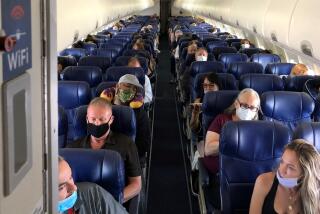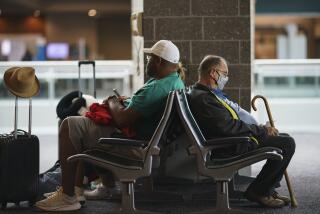Many Nations Stop Spraying Pesticide in Plane Cabins
Improving the quality of cabin air for commercial airline passengers has been a slow--some would say sluggish--process.
But recently there has been some progress on one front: After a four-year effort, the U.S. Department of Transportation has persuaded many foreign countries to abandon the practice of spraying airline passenger cabins with pesticide. This “disinsection,” as the DOT calls it, is to prevent the transport of disease-carrying insects from one country to another.
For years, many airlines sprayed while passengers were still on board. The DOT campaign to stop all pesticide spraying, even in empty cabins, began in 1994. Since then, 20 countries have stopped spraying arriving flights, said Bill Mosley, a DOT spokesman.
Six countries still require spraying of cabins while passengers are present: Grenada, India, Kiribati, Madagascar, Trinidad and Tobago and Uruguay. Only Grenada and Trinidad and Tobago have direct service from the United States, Mosley said.
Six other countries still require spraying of empty planes: Australia, Barbados, Fiji, Jamaica, New Zealand and Panama. And five--Czech Republic, Indonesia, South Africa, Switzerland and Britain--require spraying of selected flights, sometimes including passengers, such as those from places where malaria is prevalent.
Guam also requires disinsection on selected flights, but permits treatment when passengers are not present.
Since the routine spraying of aircraft in the United States was discontinued in 1979, there have not been any outbreaks here of diseases connected with imported insects, according to the DOT.
Because of the success of the campaign to stop spraying, Mosley said, the DOT dropped plans to require airlines and travel agents to notify consumers about the possibility of spraying before they buy tickets on affected flights.
Consumers can access an up-to-date list of countries that require spraying from the Web page of the Office of the Assistant Secretary for Transportation Policy at https://ostpxweb.dot.gov. Also posted are the names, telephone numbers and e-mail addresses of airline personnel knowledgeable about disinsection practices.
Airline pesticide use does not pose a risk to human health if performed properly, according to a 1995 report from the World Health Organization. But some individuals might experience “transient discomfort” after the aerosol application of insecticide, the report advised.
The Healthy Traveler appears the second and fourth Sunday of the month.
More to Read
Sign up for The Wild
We’ll help you find the best places to hike, bike and run, as well as the perfect silent spots for meditation and yoga.
You may occasionally receive promotional content from the Los Angeles Times.






